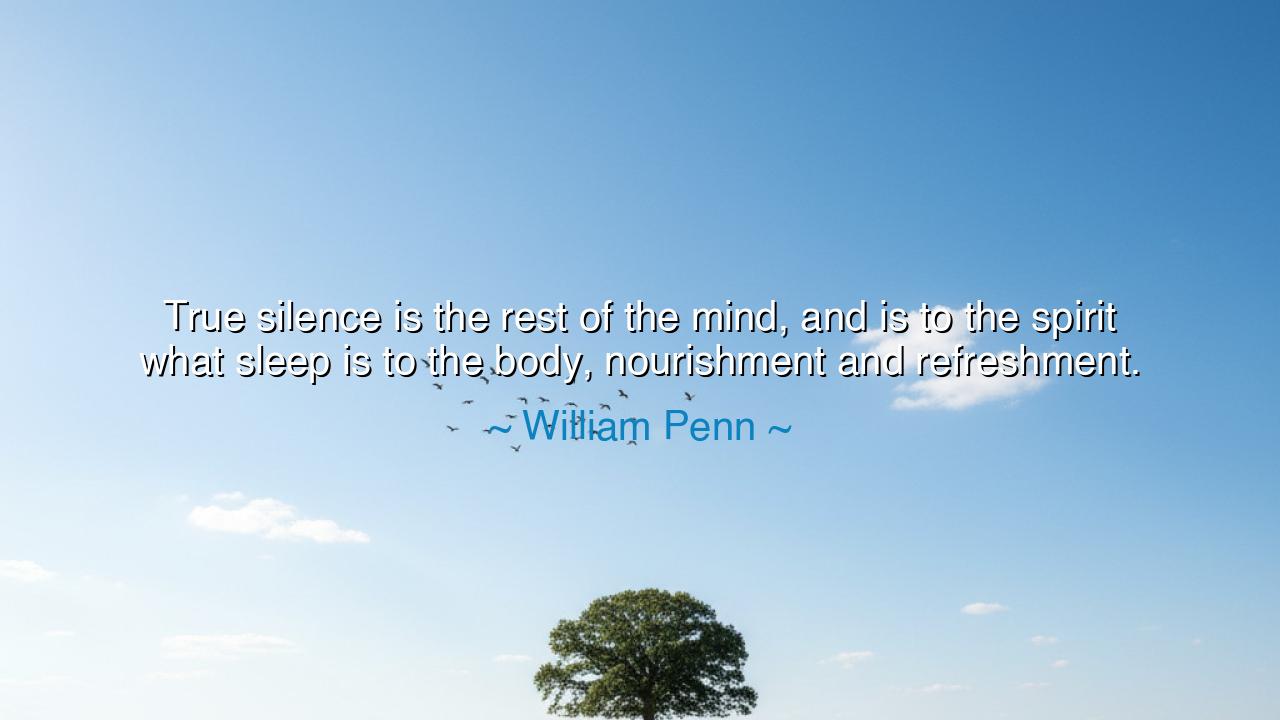
True silence is the rest of the mind, and is to the spirit what
True silence is the rest of the mind, and is to the spirit what sleep is to the body, nourishment and refreshment.






The words of William Penn, the founder of Pennsylvania and a seeker of divine truth, echo through centuries with quiet majesty: “True silence is the rest of the mind, and is to the spirit what sleep is to the body, nourishment and refreshment.” Penn, a man of deep Quaker faith, wrote these words not as poetry but as revelation — a truth learned through contemplation and tested by hardship. To him, silence was not emptiness but abundance; not void, but the sacred breath between thoughts. In his vision, silence is not merely the absence of sound — it is the music of peace that restores the weary soul.
To understand this wisdom, one must first know the man who spoke it. William Penn was no hermit but a builder — a statesman, reformer, and founder of a new world. Yet amid the noise of politics and the clamor of progress, he found that only in silence could he hear the voice of truth. His Quaker heritage taught that God does not shout; He whispers, and only the still mind can hear. Thus, Penn equated silence with spiritual nourishment, just as the body depends on sleep. The mind, too, must rest — not in distraction or indulgence, but in inward quiet where thought and soul are renewed.
The imagery of sleep and silence is profound. Just as sleep repairs the body, replenishing strength and life, silence repairs the inner world, cleansing it of confusion and fear. Modern men, intoxicated by constant noise — of cities, of ambitions, of endless words — forget that the spirit suffocates without stillness. A river cannot reflect the sky until its surface is calm. Likewise, the human spirit cannot reflect truth until it becomes silent. Penn’s metaphor is not gentle poetry; it is a moral law of nature. Silence is the soul’s healing sleep — a restoration without which no wisdom, no love, and no joy can survive.
History itself offers witness to this truth. Consider Mahatma Gandhi, who observed silence one day each week, saying, “In the attitude of silence, the soul finds the path in a clearer light.” Gandhi understood what Penn had proclaimed centuries earlier — that action without inner rest leads to exhaustion, not enlightenment. His moments of silence were not withdrawal but renewal; they allowed his mind to regain its clarity, his purpose its purity. From that quiet, he returned to the world not weakened, but strengthened — as one who had slept and awoken to a higher strength.
In a deeper sense, true silence is not only the absence of noise but the absence of turmoil. It is the stillness that comes when the heart is no longer at war with itself. Many people seek peace through possessions, travel, or distraction, but Penn’s wisdom points inward. Silence is not found in distant mountains or cloistered walls — it begins within the soul that has learned to rest in itself. When one is silent in spirit, even the chaos of the world becomes bearable, for the noise outside cannot disturb the still lake within.
To live without silence is to live without balance. The ancients knew this well. The Stoic philosopher Marcus Aurelius often wrote his meditations in the quiet hours of dawn, believing that solitude was the forge of reason and virtue. He, too, found nourishment in stillness. Without these moments of pause, he could not have ruled with wisdom. Penn’s insight aligns with this timeless truth: silence is not idleness, but the discipline of the soul — the space where strength gathers before it speaks, where wisdom ripens before it acts.
The lesson, then, is clear: seek silence not as escape, but as restoration. Let each day hold a moment where the tongue rests, the heart softens, and the mind ceases its endless spinning. In that sacred pause, you will find what the world cannot give — nourishment for the spirit, the refreshment that no feast or pleasure can replace. The one who learns to dwell in silence learns to master life itself, for peace begins not in circumstance, but in stillness.
And so, let the teaching of William Penn be remembered: to care for the soul, one must honor silence as one honors sleep. Rest your mind as you rest your body. Let the noise of the world pass like wind through trees, while you stand rooted in quiet strength. For when the spirit learns to be silent, it does not fall asleep — it awakens. And in that awakening, one discovers the truest form of nourishment — the eternal refreshment of peace.






AAdministratorAdministrator
Welcome, honored guests. Please leave a comment, we will respond soon